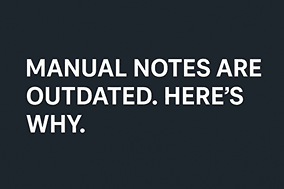
Have you ever walked out of a meeting with a notebook full of scratchy scribbled notes and the nervousness that you forgot something important? You’re not alone.
We've been instructed for decades that writing things down longhand is the key to being able to memorise them. But taking notes by hand creates an illusion of productivity that it doesn't deserve.
Are you also trying to keep up with fast conversations and end up missing out on important details? Then this blog provides you all the information, which can fix your disorganised notes and answer your professional questions, like:
- Is note-taking worth it?
- Is there a better way to do so?
The Problem with Manual Note-Taking
Manual note-taking is the old-age habit of writing down ideas.
For some of them it may be comforting, but for others like me, it's a task that I would never want to take.
Focusing on every word that you have to write down, your brain is too occupied with the mechanics.
The initial problem with handwritten notes is simple: it's time-consuming. The majority of people can only type 15 words in a minute. Even if you can type quickly, you can't match the speed when someone is describing dozens of ideas in a few minutes.
This implies:
- You find yourself omitting the things you believe you will recall (but won't).
- Your writing becomes careless and difficult to read.
- You lose context because you're so focused on keeping.
They typically ask: Is note-taking by hand superior to memory? Occasionally—but only when condensing. When you're attempting to fit in all of the information, handwriting actually causes you to leave out more than you know.
The Disadvantages of Manual Notes
Many professionals don’t realise how much time handwritten notes waste each week:
- Writing Time: You write slower than you can type or record.
- Review Time: You lose more minutes trying to read illegible handwriting.
- Time Management: You rearrange or rewrite notes to make sense later.
- Search Time: You click through pages attempting to locate what you are looking for.
If you're on tight schedules or have several projects, this time adds up very fast. Experts are estimated to spend 3–6 hours per week alone reading handwritten notes.
Why Finding Paper Notes Is Impossible
Have you ever tried to locate one specific point from a meeting that happened six months ago? Chances are, you had to:
- Scroll through endless pages
- Try to remember the date
- Eventually give up and ask someone else
This is exactly the frustration many users express on platforms like Quora and Reddit.
People often ask:
"Is manual note-taking even worth it anymore?"
Because if you can’t find, mark, or retrieve your notes when needed, what’s the point?
That’s where modern voice-based tools come in—and why voice apps beat typing becomes an eye-opener for many professionals.
Apps like VoiceToNotes.ai, Otter, and Notta allow you to:
- Instantly search keywords
- Tag important moments in real time
- Retrieve conversations or ideas within seconds
This isn’t just a feature—it’s a time-saving superpower.
Why Handwriting Leads to Mental Overload
One of the ways in which handwriting is believed to help memory is that it activates your brain more.
But what few articles mention is:
If you're concentrated on getting words on paper quickly, spelling accurately, and ensuring you get everything, you're packing a great deal of pressure into your working memory.
For a clear understanding of how modern tools solve these issues, see How VoiceNotes Improve Your Productivity.
A Journal of Educational Psychology study found that when people tried to jot down as many things as possible, they recalled 23% fewer items than when they used a less complicated, technological approach.
Real Story: The Missed Details
Imagine this: One of Emily's sales managers kept all client calls on paper notes. She loved her system—until the day it failed her.
In rushing through an important deal, she made careless bullet notes but failed to note an important objection.
Weeks later, when she tried to close, she wasn't sure what the client had inquired about prices.
Her ambiguous responses lost her trustworthiness—and the sale.
It happens more often than you might think.
Incomplete notes not only lead to confusion. They damage your reputation and your outcomes.
Can Manual Notes Be a Distraction?
Yes.
Most people think that they remain focused by jotting down notes, but in reality, it is a distraction too:
- You worry about if you're writing fast enough.
- You're worried about spacing or layout.
- You're no longer actively listening.
Is manual note-taking even effective in fast-paced discussions or lectures? If the very act of writing prevents you from understanding what's being said, then it might be time to rethink your process.
Instead, try a smarter note‑taking app like VoiceToNotes.ai—designed to listen, transcribe, summarize, and organize your notes for you in real time, so you can focus on what matters most: listening and understanding.
Collaboration is Harder Using Paper Notes
It doesn't occur in solitude today. You're supposed to:
- Share information with your team.
- Sync notes across devices.
- Maintain records for compliance.
Handwritten notes do not meet all these criteria:
- You can't simply transfer them over without duplicating them.
- There’s no version control.
- One spilled coffee ruins everything.
Smart tools like VoiceToNotes.ai and other note-taking tools allow you to:
- Share
- Search
- Lock your notes in a split second so that your team is perfectly aligned.
Manual vs. Voice Notes
Most people believe that typing or using computers will ruin their memory. But the surprising truth is:
Handwriting works great when it comes to capturing deep ideas in a learning setup. However, in high-pressure, fast-moving environments—like meetings or brainstorming—handwritten notes often miss key points.
That’s where the AI notes vs handwritten notes comparison becomes important.
According to Harvard Business Review:
- People who used AI transcription with active summarizing retained more information
- They revisited their notes more regularly
- And made fewer mistakes
When speed, accuracy, and collaboration matter, AI-powered transcription tools offer smarter solutions. If you're exploring better ways to take notes without losing clarity, here are some smarter voice-to-notes alternatives worth checking out.
| Feature | Handwritten Notes | Digital Transcription |
|---|---|---|
| Accuracy and Details | Often misses specifications | Captures exact thoughts and ideas |
| Speed | Time-consuming with many errors | Quick and fewer mistakes |
| Retention | Mixed results | High with summarizing features |
| Organization | Tough to organize | Stored virtually and organized |
| Readability | Low | High |
Frequently Asked Questions
What are some of the disadvantages of note-taking by hand?
- Slower speed
- Hard to read later
- Difficult to obtain
- Takes longer to organize
- Simple to lose or damage
Is taking notes a distraction? Yes. When you fear you can't keep up, you find yourself not listening actively.
Is writing superior to memory? Not usually. Typing or dictation is generally more suitable for precise or quick information.
What are the main problems with handwritten annotations?
- Partial information
- Time lost organizing
- No search, no tag
- Frustration when working
Is it preferable to take paper notes or online notes? In most contemporary workplaces, electronic note-taking is quicker, more secure, and simpler to handle.
Why It Feels Like a Waste of Time
Most experts think note-taking from a book or a meeting is wasting your time. The real problem is not note-taking—it's what you're doing while taking them.
When putting it all down in script:
- You spend more time recording than understanding.
- You spend hours planning afterwards.
- You can't easily get or trade what you need.
What to Do Instead
If you wish to no longer feel swamped by notes, this is what you do:
- Use computer transcription software that can automatically transcribe everything you hear.
- Recap your meeting notes to reinforce your understanding.
- Tag and search within your notes rather than turning pages.
- Instantly share and work with your team.
This approach is not merely time efficient—it gets you into the zone of the important work.
Conclusion
Final Thoughts Written notes may be handy, but they're keeping you behind. From slower speeds to lost data, the underlying costs are too great for most professionals today.
If you're willing to bid farewell to messy notebooks and useless routines, there's a better way. Ready to take smarter, quicker notes? Try VoiceToNotes.ai for free today and see how easy it is to catch ideas.


.png)